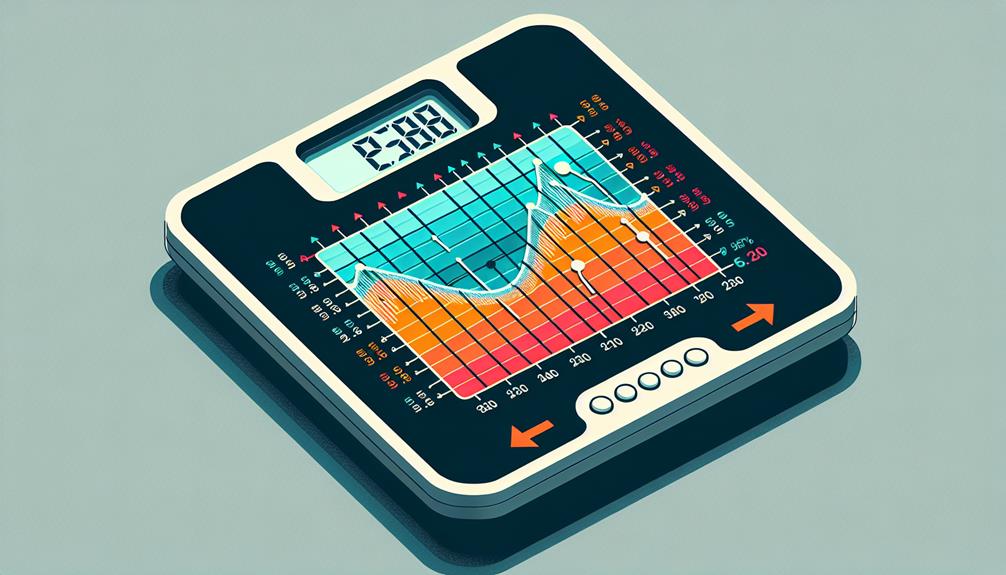Ideal Body Weight Calculator
When it comes to determining your ideal body weight, using a reliable calculator can be a helpful tool. However, knowing how to interpret the results and set realistic goals based on those numbers is crucial. By understanding the significance of healthy weight management and the benefits of utilizing a weight calculator, you can pave the way towards a healthier lifestyle. But what exactly constitutes a healthy weight goal, and how can you ensure it aligns with your individual needs and well-being? Let's explore the nuances of setting achievable targets and monitoring your progress effectively.
Key Takeaways
- Use body weight calculator for insights and healthy goal setting.
- Set realistic targets aligned with individual characteristics and guidance.
- Track progress consistently, adjust goals for sustainable results.
- Focus on overall health, make gradual changes for long-term well-being.
Importance of Setting Healthy Weight Goals
Setting healthy weight goals is crucial for achieving optimal physical and mental well-being. Developing a healthy mindset towards weight management is essential for sustaining positive changes in your lifestyle. By setting realistic and achievable goals, you can make gradual progress towards reaching your ideal weight. It is important to understand that healthy weight loss or gain is a gradual process that requires patience and consistency.
When you set healthy weight goals, you are not just focusing on numbers on a scale but also on improving your overall health. Embracing a positive mindset towards your body and weight can lead to long-lasting changes that benefit both your physical and mental well-being. Remember that small, sustainable changes in your diet and exercise routine can have a significant impact on your weight over time.
Understanding Ideal Body Weight Calculation
To understand your ideal body weight, it is crucial to consider various factors such as your height, age, gender, and body composition. Calculating your Body Mass Index (BMI) is a useful tool in determining a healthy weight range based on your height. BMI is calculated by dividing your weight in kilograms by your height in meters squared. This calculation provides an estimate of your body fat and helps in assessing your overall health status.
When it comes to weight management, understanding your BMI can guide you in setting realistic weight goals. The table below outlines BMI categories and their corresponding weight status.
| BMI Category | BMI Range | Weight Status |
|---|---|---|
| Underweight | < 18.5 | Below normal weight |
| Normal | 18.5-24.9 | Healthy weight range |
| Overweight | 25-29.9 | Above normal weight |
| Obese | ≥ 30 | Significantly above normal weight |
Benefits of Using a Weight Calculator

Utilizing a weight calculator can provide valuable insights into your health and assist in setting achievable fitness goals. When embarking on a fitness journey, knowing your ideal body weight is crucial for effective weight management. A weight calculator takes into account factors like height, age, gender, and activity level to determine a healthy weight range for you.
By using a weight calculator, you can establish a baseline for your current weight status and compare it to the recommended range for your body type. This information serves as a starting point for setting realistic goals and tracking your progress over time. Moreover, having a clear understanding of your ideal body weight can motivate you to make positive lifestyle changes to achieve better health outcomes.
Incorporating a weight calculator into your fitness routine can help you stay focused and committed to your weight management goals. It provides a structured approach to monitoring your progress and adjusting your strategies as needed. Ultimately, the benefits of using a weight calculator extend beyond numbers on a scale, guiding you towards a healthier and more balanced lifestyle.
Setting Realistic Targets for Weight
Establishing realistic weight targets based on your individual characteristics and goals is essential for effective and sustainable progress in your fitness journey. Setting realistic expectations is crucial to avoid disappointment and maintain motivation. When setting weight targets, consider factors such as your body type, metabolism, activity level, and overall health. Aim for achievable milestones that align with your long-term objectives.
To set realistic weight targets, consult with a healthcare provider or a fitness professional who can help you determine a healthy and sustainable goal. Avoid aiming for rapid weight loss, as it can be detrimental to your health and lead to unsustainable outcomes. Instead, focus on gradual progress and celebrate each milestone achieved along the way. Remember that healthy weight management is a journey, not a race. By setting achievable milestones and having realistic expectations, you can make steady progress towards your ideal weight while maintaining your overall well-being.
Tracking Progress and Adjusting Goals

When monitoring your progress and adapting your goals, it is essential to track key metrics consistently to ensure you are on the right path towards achieving your desired outcomes. Progress tracking is crucial in maintaining a healthy mindset throughout your weight journey. Regularly recording your weight, body measurements, food intake, and exercise routine can provide valuable insights into how your body is responding to your efforts. By analyzing this data, you can identify patterns, successes, and areas that may require adjustments.
Goal adjustment is a natural part of any weight management plan. As you progress, you may find that your initial goals need to be revised to better align with your current circumstances and aspirations. It is important to approach goal setting with flexibility and a willingness to adapt based on your evolving needs. Remember that the ultimate goal is not just a number on the scale but rather overall health and well-being. Stay focused, stay patient, and stay committed to the journey ahead.
Frequently Asked Questions
Can the Ideal Body Weight Calculator Be Used for Children and Teenagers as Well?
Yes, the ideal body weight calculator can be used for children and teenagers. It considers growth patterns, BMI, and is a valuable tool in pediatric nutrition and adolescence. It helps track healthy weight goals effectively.
Are There Any Limitations to Using a Weight Calculator for Individuals With Certain Medical Conditions or Disabilities?
Like a compass guiding a ship, medical conditions and disabilities can steer you away from relying solely on a weight calculator. Understand limitations and seek healthcare professional advice to navigate your health journey wisely.
How Often Should One Re-Calculate Their Ideal Body Weight as Their Fitness Goals Change?
As your fitness progress and body composition change, aim to recalculate your ideal body weight every 3-6 months. This interval allows you to track changes accurately and adjust goals accordingly for optimal health and performance.
Are There Specific Dietary Recommendations or Exercise Plans That Should Be Followed Alongside Setting Healthy Weight Goals?
When setting healthy weight goals, it's crucial to focus on exercise routines and maintain a nutritional balance. Don't forget the impact of mental health and support systems in achieving long-term success.
What Factors Should Be Taken Into Consideration When Setting Realistic Targets for Weight Loss or Gain, Aside From Just the Numbers on the Scale?
When setting weight goals, it's crucial to focus on more than just numbers. Consider factors like body composition, importance of mindful eating, and a tailored exercise routine. For example, a mix of strength training and cardio can enhance results.
Conclusion
In conclusion, setting healthy weight goals is crucial for overall well-being. Using an ideal body weight calculator can help you track progress and make necessary adjustments. Just like a compass guiding a ship through rough waters, these tools can steer you towards a healthier and happier life. Stay focused, stay determined, and remember that small steps lead to big results in your journey towards achieving your ideal body weight.













